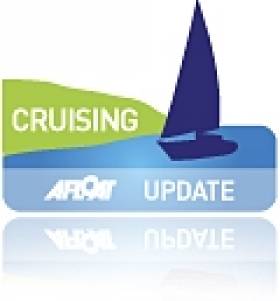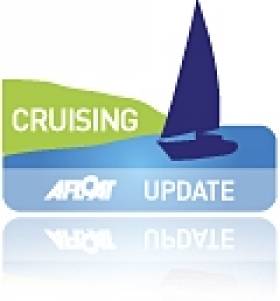Displaying items by tag: Arctic Circle
Irish Sailing Explorers Return from Arctic Circle Voyage
#arcticcircle – The Irish 'North of Disko' expedition, organised by Killary Adventure Company, returned last week from its ten-week voyage to the Arctic Circle and the west coast of Greenland. Stunning images of ice and film footage from the adventure are currently being collated for exhibition and a feature length documentary. The crew sailed from Galway on the 14th June and battled some wild weather on their Atlantic crossing, before reaching their destination and exploring Greenland's spectacular coastline, ice fjords and glaciers.
The crew sailed over 2000nm to Upernavik in Greenland, well inside the Arctic Circle, from where a team of four kayakers set out on a 300km unsupported sea kayak south, navigating through fjords and ice fields, while the team of three climbers tackled a series of first ascents, as they followed the kayakers south, on board the 49ft, ex admirals cup racing yacht the 'Killary Flyer'.
Adding a further dimension to the expedition, photographer Daragh Muldowney has captured some spectacular images of the disappearing ice and will be hosting an exhibition in the coming months.
The expedition was led by Jamie Young, MD of Killary Adventure Company, whose previous expeditions include the successful Irish Cape Horn Sea Kayak Expedition in 1989, the Guinea Bissau Sea Kayak Expedition in 1992, and the 'South Aris' expedition, which attempted to re-enact Shackleton's epic boat trip from Elephant Island to South Georgia, in 1997.
The crew arrived into Killary Harbour on the morning of Thursday 15th August and are currently readjusting to life ashore.
#arcticcircle – The Galway to Greenland Expedition 'North of Disko' has started its return journey from high in the Arctic Circle along the west Greenland coast. The team, lead by Jamie Young aboard the 49ft Killary Flyer yacht, set sail from Galway on the 14th June and have spent the past six weeks exploring the spectacular coastline by kayak, climbing and sail, as well as through film and photography.
The expedition, run by Killary Adventure Expeditions, aims to document this changing coastline and produce a comprehensive art photography exhibition showcasing the fragile nature of the Arctic environment as well as climbing and kayaking guides to the west Greenland coast. Art photographer Daragh Muldowney of Dulra Photography is one of the crewmembers and has managed to capture some incredible images of the ice from the ice cap and glaciers to icebergs. The expedition has also been filmed along the way with the aim of producing a short documentary on the experience.
The crew are currently on their way south to the town of Sisimuit, still inside the Arctic Circle, where they will prepare the boat for their return journey across the Atlantic. They aim to arrive back in Killary Harbour on approximately the 20th August.
"The expedition so far has been hugely rewarding" according to Jamie. "We've been lucky enough to have been welcomed into the Inuit communities we've visited and it's been very interesting to hear about the social, environmental and political challenges faced by them at present".
The crew encountered three significant storms on the initial Atlantic crossing so are hoping for a less turbulent return journey. You can follow their progress through daily blogs from the crew at www.northofdisko.com or view a selection of images from the trip so far on their facebook page www.facebook.com/pages/Killary-Adventure-Expeditions. You can see examples of Daragh's previous work at www.dulra.com
#Adventure - An Irish duo have returned home after crossing the world's largest frozen lake in Russia.
As RTÉ News reports, Mike O'Shea from Dingle and Clare O'Leary from Bandon traversed the 640km-long Lake Baikal in Siberia over 26 days, contending with temperatures 30 degrees below freezing.
The challenge was the second mission in the veteran adventurer pair's 'Ice Project', an attempt to cross the world's main ice caps before the end of 2016.
Their next adventure will be a crossing of either Iceland or Greenland - where another intrepid group of Irish adventurers are headed this summer, as previously reported on Afloat.ie.
Meanwhile, rower Paul Gleeson writes in The Irish Times about his own upcoming challenge, joining three other men in a 25ft rowing boat to travel the 2,000 miles of the Northwest Passage in the Canadian Arctic.
Limerick man Gleeson, who is now based in Canada, compares the trek to the infamous Franklin Expedition through the passage in the mid 1800s - a tragic mission with an Irish connection through its second-in-command Francis Crozier.
The Irish Times has much more on the story HERE.


























































